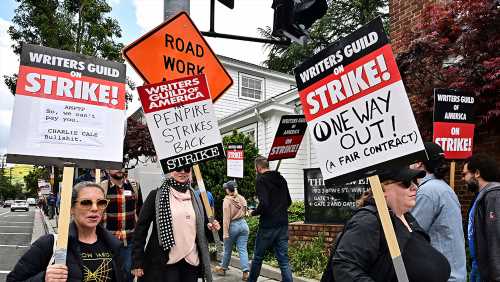The Writers Guild of America responded Tuesday to the latest proposal from the Alliance of Motion Picture and Television Producers, but any hopes for an easy resolution of the 106-day strike were quickly dispelled.
The WGA did bend slightly on a few items, according to sources familiar with the talks. But the union negotiators did not offer the significant concessions that the studio side was looking for in response to its own offer.
The guild has continued to hold to its proposal for a minimum staff size for TV writers, though it offered to lower the minimum by one writer. But the WGA was unimpressed with the AMPTP’s offer to give showrunners the authority to hire up to a certain minimum, which would increase based on the production budget.
By no means is that the only sticking point. The two sides remain at odds on items across the board, including streaming residuals and a higher minimum tier for TV writer-producers.
Multiple studio sources had been optimistic that the AMPTP’s latest offer would mark a breakthrough in the talks. But WGA negotiators had counseled caution, warning members not to trust studio leaks suggesting that a deal was at hand.
The two sides returned to the bargaining table last Friday for the first time since the strike began on May 2.
As Bloomberg first reported, Netflix co-CEO Ted Sarandos and Disney CEO Bob Iger have taken a personal interest in seeking an end to the strike.
The WGA wants to tie streaming residuals to the popularity of a show, but streamers had adamantly refused to share such viewership data. The latest offer from the AMPTP, however, included a proposal to share the number of hours each show is viewed, though writers’ compensation would not be tied to that figure. The WGA continues to stand by its original proposal, raising questions about whether “hours” would be the correct metric to use, rather than views.
The WGA was not expected to leap at the AMPTP’s latest offer, as it was generally understood that hard bargaining remained to be done before a deal could be reached. But the studio side had hoped that both sides would be closer to an agreement than they are.
The WGA is also seeking a provision that would allow its members to honor other unions’ picket lines. That provision would mean that many writers likely would not return to work until the SAG-AFTRA strike is resolved, as the two unions have taken pains to express mutual solidarity.
The AMPTP appears unwilling to accept that proposal, which was first made on Aug. 4.
The WGA also wants assurances that the union health plan will maintain funding despite the strike, and that members will not lose health coverage because of the strike.
Matt Donnelly contributed to this story.
Read More About:
Source: Read Full Article

